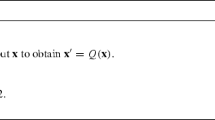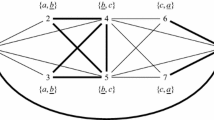Abstract
We consider polymatrix coordination games with individual preferences where every player corresponds to a node in a graph who plays with each neighbor a separate bimatrix game with non-negative symmetric payoffs. In this paper, we study \(\alpha \) -approximate k-equilibria of these games, i.e., outcomes where no group of at most k players can deviate such that each member increases his payoff by at least a factor \(\alpha \). We prove that for \(\alpha \ge 2\) these games have the finite coalitional improvement property (and thus \(\alpha \)-approximate k-equilibria exist), while for \(\alpha < 2\) this property does not hold. Further, we derive an almost tight bound of \(2\alpha (n-1)/(k-1)\) on the price of anarchy, where n is the number of players; in particular, it scales from unbounded for pure Nash equilibria (\(k = 1)\) to \(2\alpha \) for strong equilibria (\(k = n\)). We also settle the complexity of several problems related to the verification and existence of these equilibria. Finally, we investigate natural means to reduce the inefficiency of Nash equilibria. Most promisingly, we show that by fixing the strategies of k players the price of anarchy can be reduced to n/k (and this bound is tight).
Access this chapter
Tax calculation will be finalised at checkout
Purchases are for personal use only
Similar content being viewed by others
Notes
- 1.
In [9] the bimatrix games on the edges may have negative payoffs and this is exploited in the PLS-completeness proof. However, we can accommodate this in our model by adding a sufficiently large constant to each payoff.
- 2.
A graph is a pseudoforest if each of its connected components has at most one cycle.
References
Anshelevich, E., Sekar, S.: Approximate equilibrium and incentivizing social coordination. In: Proceedings of 28th Conference on Artificial Intelligence (AAAI), pp. 508–514 (2014)
Apt, K.R., Rahn, M., Schäfer, G., Simon, S.: Coordination games on graphs (extended abstract). In: Liu, T.-Y., Qi, Q., Ye, Y. (eds.) WINE 2014. LNCS, vol. 8877, pp. 441–446. Springer, Heidelberg (2014)
Aumann, R.J.: Acceptable points in general cooperative n-person games. In: Luce, R.D., Tucker, A.W. (eds.) Contribution to the Theory of Game IV. Annals of Mathematical Study, vol. 40, pp. 287–324. Princeton University Press, Princeton (1959)
Aziz, H., Brandt, F., Seedig, H.G.: Stable partitions in additively separable hedonic games. In: Proceedings of the 10th International Conference on Autonomous Agents and Multiagent Systems (AAMAS), pp. 183–190 (2011)
Bachrach, Y., Syrgkanis, V., Tardos, É., Vojnović, M.: Strong price of anarchy, utility games and coalitional dynamics. In: Lavi, R. (ed.) SAGT 2014. LNCS, vol. 8768, pp. 218–230. Springer, Heidelberg (2014)
Balcan, M., Blum, A., Mansour, Y.: Improved equilibria via public service advertising. In: Proceedings of the 20th ACM-SIAM Symposium on Discrete Algorithms (SODA), pp. 728–737 (2009)
Bhalgat, A., Chakraborty, T., Khanna., S.: Approximating pure Nash equilibrium in cut, party affiliation, and satisfiability games. In: Proceedings of the 11th ACM Conference on Electronic Commerce (EC), pp. 73–82 (2010)
Bogomolnaia, A., Jackson, M.O.: The stability of hedonic coalition structures. Games Econ. Behav. 38(2), 201–230 (2002)
Cai, Y., Daskalakis, C.: On minmax theorems for multiplayer games. In: Proceedings of the 22nd ACM-SIAM Symposium on Discrete Algorithms (SODA), pp. 217–234 (2011)
Caragiannis, I., Fanelli, A., Gravin, N.: Short sequences of improvement moves lead to approximate equilibria in constraint satisfaction games. In: Lavi, R. (ed.) SAGT 2014. LNCS, vol. 8768, pp. 49–60. Springer, Heidelberg (2014)
Christodoulou, G., Mirrokni, V.S., Sidiropoulos, A.: Convergence and approximation in potential games. Theo. Comput. Sci. 438, 13–27 (2012)
de Keijzer, B., Schäfer, G.: Finding social optima in congestion games with positive externalities. In: Epstein, L., Ferragina, P. (eds.) ESA 2012. LNCS, vol. 7501, pp. 395–406. Springer, Heidelberg (2012)
Koutsoupias, E., Papadimitriou, C.: Worst-case equilibria. Comput. Sci. Rev. 3(2), 65–69 (2009)
Leme, R.P., Syrgkanis, V., Tardos, E.: The curse of simultaneity. In: Proceedings of the 3rd Conference on Innovations in Theoretical Computer Science (ITCS), pp. 60–67 (2012)
Monderer, D., Shapley, L.S.: Potential games. Games Econ. Behav. 14(1), 124–143 (1996)
Roughgarden, T.: Intrinsic robustness of the price of anarchy. In: Proceedings of the 41st ACM Symposium on Theory of Computing (STOC), pp. 513–522 (2009)
Yannakakis, M., Gavril, F.: Edge dominating sets in graphs. SIAM J. Appl. Math. 38(3), 364–372 (1980)
Author information
Authors and Affiliations
Corresponding author
Editor information
Editors and Affiliations
Rights and permissions
Copyright information
© 2015 Springer-Verlag Berlin Heidelberg
About this paper
Cite this paper
Rahn, M., Schäfer, G. (2015). Efficient Equilibria in Polymatrix Coordination Games. In: Italiano, G., Pighizzini, G., Sannella, D. (eds) Mathematical Foundations of Computer Science 2015. MFCS 2015. Lecture Notes in Computer Science(), vol 9235. Springer, Berlin, Heidelberg. https://doi.org/10.1007/978-3-662-48054-0_44
Download citation
DOI: https://doi.org/10.1007/978-3-662-48054-0_44
Published:
Publisher Name: Springer, Berlin, Heidelberg
Print ISBN: 978-3-662-48053-3
Online ISBN: 978-3-662-48054-0
eBook Packages: Computer ScienceComputer Science (R0)




